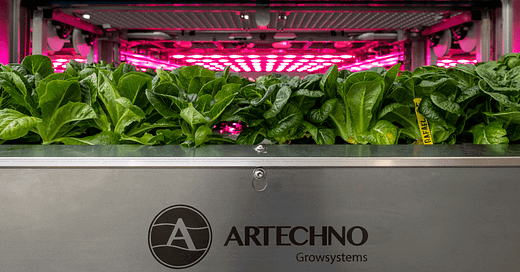Artechno Growsystems on Navigating AgTech Investments in the Middle East
Navigating the Complex Landscape of AgTech Investments in the Middle East: Insights from Artechno Growsystems
Key Takeaways
Public and private investments in AgTech have different risk profiles and objectives.
Events like the Qatar boycott and the World Cup have influenced investment behavior in the region.
Education and demonstration units are crucial for the growth of the AgTech industry in the Middle East.
Off-take agreements and partnerships with airlines could be beneficial for AgTech companies.
Companies must build confidence in their solutions due to past failures in the region.
In a recent interview with the General Manager Middle East of Artechno Growsystems, we delved into the complexities of AgTech investments in the Middle East. The conversation covered various topics, from the differing risk appetites of public and private investors to the unique challenges and opportunities in the region. This editorial aims to unpack these insights, offering a nuanced understanding of the AgTech landscape in the Middle East.
Public vs. Private Investments
One of the most striking points made during the interview was the difference between public and private investments. "Public investments want to cover the risk at 200%," the General Manager noted. This contrasts with private investors, who may have different objectives related to food security and are often more willing to take calculated risks.
The Qatar Phenomenon
The situation in Qatar serves as an interesting case study. "Qatar is different because with their boycott and the World Cup football, it has boosted their investment in the place and forced them to take more risk," he said. This has led to faster growth, especially among private entrepreneurs. Sheikh Tamin's approach to calculated risk was highlighted as a driving factor.
The Importance of Education
"In this region, the knowledge in vertical farming, greenhouse, or let alone agriculture is still nascent," the General Manager pointed out. He emphasized the importance of investing in educating the next generation, which would contribute to the growth of the industry. Demonstration units serve as an effective way to showcase technology and inform people about the possibilities within AgTech.
Business Considerations
Understanding the technology is just the first step; people also need to understand the farming business. "The need to have off-take agreements is more important," he stated. Airlines like Qatar Airlines, Emirates, Saudi Airlines, and Etihad could be potential clients, as they seek consistent produce to maintain their brand reputation.
Building Confidence in the Region
Companies looking to establish themselves in the region must invest time and resources to build confidence in their solutions. "There's been a lot of failed projects in the past," he cautioned. This makes it imperative for new entrants to demonstrate reliability and effectiveness before they can secure clients.
Innovation at Affordable Prices
"You need to be innovative at affordable prices, as it is a great combination," the General Manager advised. This is particularly important in a region where the cost of failure can be high, both financially and in terms of reputation.
Trending Crops
When it comes to the types of crops that are gaining traction in the region, the landscape is diverse. "Crops that are trending in the region are wide & various (leafy, micro, spinach…)," he said. While there had been interest in strawberries, that seems to have waned in recent months.
Conclusion
The insights from Artechno Growsystems' General Manager offer a comprehensive look into the AgTech investment landscape in the Middle East. From the differing risk appetites of public and private investors to the unique market dynamics in places like Qatar, the region presents both challenges and opportunities. Education and demonstration are key to growing the industry, but companies must also focus on building confidence and understanding the business aspects, such as off-take agreements. As the AgTech sector in the Middle East continues to evolve, these insights serve as valuable guideposts for investors, entrepreneurs, and policymakers alike.





